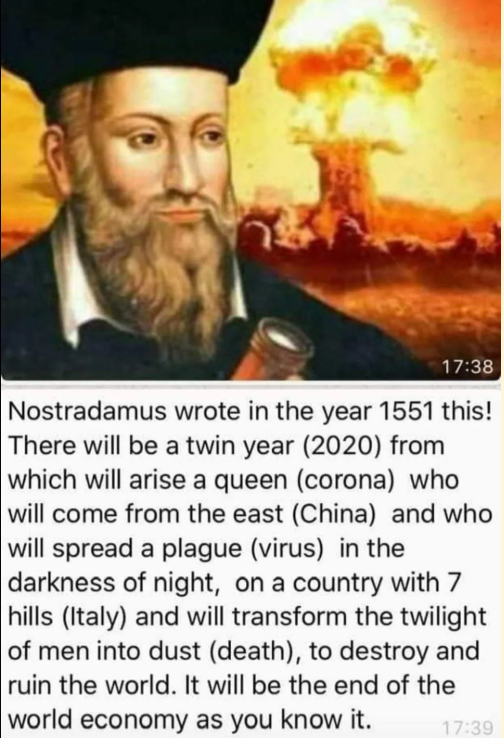
Still rubbing your eyes and thinking you are in some kind of bad B rated horror movie about a viral epidemic that spreads throughout the world? We tried that whole thing where you take a nap and wake up hoping for an alternative reality; yet here we are. Global pandemic. Just like some of our favorite apocalyptic movies. Except we’re living it, and we don’t know when things will ‘go back to normal’.
The writers are Puzzle Box Horror have been spending some time on the couch (not the therapists couch —(yet) just our regular couch with our dogs and favorite horror books or movies). And we’ve been watching some pretty ‘out there’ claims about ancient prophesies about plagues. So, we thought we’d do a bit of digging to see if oral tradition, history and lore have provided us with a warning about a global pandemic.
Meet Nostradamus the Prophet Most Likely to be Misquoted on Social Media
You can’t really talk about eerie futuristic predictions from prophets, without hearing Nostradamus’ name come up in conversation. But do you know why this unusual and uncannily accurate contemporary prophet is thought to be one of the more reliable sources for future predictions?
Nostradamus was born in France in 1503, and he became a renowned physician who specialized in treating plague victims in both Italy and France. He was surrounded by death and the battle for life constantly, and many people believe he suffered both a psychotic break and psychic awakening at the same time as he began to delve into occult practices. He wrote a book called “The Prophecies” in 1555.
While dealing with the plague, Nostradamus developed some innovative and highly effective therapies, that focused on hygiene (which was revolutionary at the time in medicine) and the use of natural extracts including rosehip, Vitamin C, low fat diets and fresh air and exercise for his patients. Because of his celebrity status as a successful physician and healer, he was financially supported by wealthy families in Provence.
While Nostradamus was traveling on a medical mission to Italy, his wife and children succumbed to the plague. The fact that he was unable to heal or save his own family, did significant damage to his celebrity reputation as a renowned healer, and he lost much of his patronages from the upper class in Provence as a result.
In 1547 he remarried a rich widow named Anne Ponsarde, and they had six children together. Nostradamus published two medical books “Galen, the Roman Physician” and “The Traite des Fardemens”, which was a recipe book of medicinal concoctions for treating the plague as well as preparations for cosmetics to hide symptoms of illness effectively.
The prophet would spend hours before a bowl of hot water, in which a secret blend of herbs was steeped which he would inhale. After imbibing the infusion, he would then begin to write his prophesies, many of which have come true throughout history, since the publishing of “The Prophecies” in 1555.

Some suspect that the use of psychedelic compounds was used by Nostradamus to acquire the state of mental levity and clairvoyance, where he could see into the future and predict events and disasters. We may never know what ‘herbs’ he used, but there are an impressive number of predictions that seem to have come true over the past 465 years.
The Meme About Nostradamus Predicting COVID-19 Pandemic is False
Of course, in a high-stress super surreal “what kind of horror movie has our reality become’ moment in human history, there is going to be a meme that gets everyone going. We’re not against memes that are funny, but this one is pretty convincing and terror inducing if you are already feeling more than a little unhinged about the current world events.
When you read that meme, you are probably thinking… ‘woah, that’s pretty coincidental considering the current pandemic’. Well, that’s the thing about fake memes; they are meant to convince you that they are true and freak you out more than little.
Snopes fact checked the meme, and guess what? In all the quatrains in Nostradamus, there is no reference as indicated in the meme. So, you can scratch that one off the list of lore and legend; and if you think about it, Nostradamus lived in a time of plague, lost family to plague, so predicting a dire plague in the future wouldn’t have been that revolutionary for him. Plague was kind of part of their daily back in the 1500s.
The Prophecy from a Buddhist Monk That Made Us Lose Sleep
We don’t debunk paranormal, and we are explorers into horror and the unexplained. So, even though the meme about Nostradamus was a wash, that doesn’t mean that there are not other kinds of prophesies out there that DO strike that creepy note for accuracy, beyond circumstantial evidence.

“The year 2020 – The year all of China will weep. The omens will be so bad that the New Year will not be celebrated. Then the plague will come. It will come with a fury – the tigers and the wolves will hide in the mountains. The plague will encompass all the land – and will eventually spread to the whole world. Very soon – rice will become so expensive that no one can eat. Then the rivers will sink all the boats. People in that year will only be able to harvest rice in the very early spring. There will be no harvest of late season rice, beans, wheat, and oats because vast clouds of locusts will lay waste to the entire countryside.”
This was written by a Buddhist Monk in the Forbidden City (Gentleman Zigong) in the 20th century, and excerpt from the “Ancient Internal Bible”. Then the Buddhist Monk furthers:
“I, Gentleman Zigong, will tell you Chinese in 2020 how to survive. Remain very close to your families and your neighbors. The best is to have stored up plenty of gold and food to live and share freely with those you love. Tolerate no thieves among the people. Be uniters and not dividers. If you can do all these things, you will survive.”
Have you heard of any other prophesies that seem to point toward the current COVID19 global pandemic? Share a link with us in the comments below.
Generation X gamer girl, marketing professional and closet horror writer. Lover of fast moving horror movies, slow moving zombies and historically based paranormal lore.
